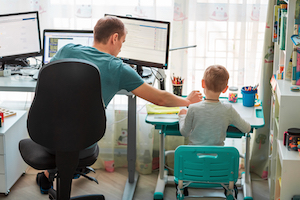 A pair of new studies conducted on behalf of the not-for-profit organization, the Canadian Men’s Health Foundation (CMHF) looked at how COVID-19 is affecting fathers in Canada.
A pair of new studies conducted on behalf of the not-for-profit organization, the Canadian Men’s Health Foundation (CMHF) looked at how COVID-19 is affecting fathers in Canada.
“The impact of stress resulting from an unexpected change on the health and well-being of men and fathers was under reported in the research and media landscape,” Joanne Watson of the CMHF told us. “We wanted to understand more than just anecdotal information, such that men, and fathers in particular, were being impacted by the public health measures, including the economic, social and cultural restrictions.”
Researchers ran a survey of over 1000 men coupled with a focus group study with 45 fathers that dug deeper into the survey findings. Among the findings, 40 per cent of the respondents felt COVID-19 has had a positive impact on their role as a father, 52 per cent are more aware of their importance as a father, and 60 per cent felt closer to their children. Forty-nine per cent have decided to be more engaged as a father in the future.
“Through the focus groups, we gained insight into the first-hand lived experience of these men,” Watson told us. “In particular, we now better understand how reported changes affected their sense of self and their role as fathers. For the latter, we explored whether they relate to their children or their partners differently, and what it felt like for them to interact with a group of men online.”
As a follow up to the CMHF survey, The Men’s Initiative (TMI), a non-profit organization, ran six online focus groups for the duration of a week with 45 fathers from coast to coast across Canada using a secure Zoom platform. Participants were anonymous and their confidentiality was maintained through various call-in options.
“There is a very tangible tension at hand between fathers’ experience of their family dynamic during COVID-19 versus what their ‘normal’ family dynamics were prior to COVID-19,” Watson told us. “In particular we found four major conclusions.”
The study found that fathers value this time with their children and are enjoying being more actively involved. Simultaneously, they are getting to know their own strengths and areas for improvement as fathers.
Researchers also found that fathers’ find that this time at home more closely reflects what they imagined family/fatherhood should be. They spend more quality time together and life is less hectic now that there is less running around to complete parallel activities.
“Fathers realize how much their partners are doing (around the home/childcare) and how they can support,” Watson told us. “Many have a desire to move toward a balanced and shared responsibility with regards to household duties and relationships with their children.”
Lastly, the study found that fathers appreciate the opportunity to connect with other men.
“Hope and affirmation, confirmation of similar experiences,” Watson told us. “This is consistent with the work that we’ve done with firefighters, police officers, athletes, military and men who have experienced life’s transition (e.g., end of life and retirement).”
“We were not surprised that men felt closer to their children but were surprised by the strong response of how many fathers contrasted family life pre and post COVID,” Watson told us. “Pre COVID involved super busy lives with relatively little dedicated family time.”
What did surprise researchers was how many fathers expressed the idea that life during the pandemic feels more like how they imagined family life might be with lots of time together and lives lived less in parallel with everyone doing their own thing.
“The other surprise was how many fathers feel they are learning a great deal about their children and their own parenting during this time,” Watson told us. “A few fathers even said that they now realize that feedback about their children given by teachers, which they previously resisted, has been confirmed by spending more time with their kids.”
Watson believes results show that that there is a need to better understand the experience of fathers in relationship to a culture of busyness, that fathers are hungry for opportunities to connect in deeper and more meaningful ways, and that there is an opportunity for fathers to be able to connect with each other.
“It may also have implications for the workplace since fathers may also want to work from home more often and some said they may retire earlier now,” Watson said.
Patricia Tomasi is a mom, maternal mental health advocate, journalist, and speaker. She writes regularly for the Huffington Post Canada, focusing primarily on maternal mental health after suffering from severe postpartum anxiety twice. You can find her Huffington Post biography here. Patricia is also a Patient Expert Advisor for the North American-based, Maternal Mental Health Research Collective and is the founder of the online peer support group - Facebook Postpartum Depression & Anxiety Support Group - with over 1500 members worldwide. Blog: www.patriciatomasiblog.wordpress.com
Email: tomasi.patricia@gmail.com